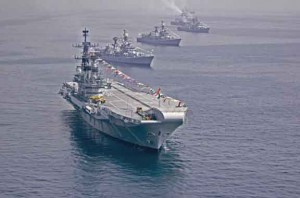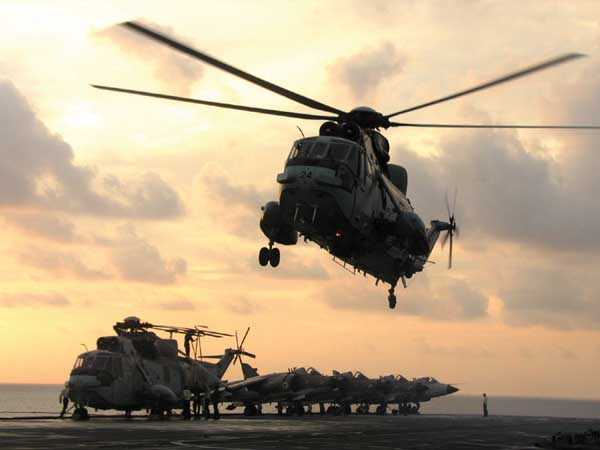In the civil sector, India is self-sufficient in almost everything it needs and has overcome pressures that have been exerted. Not so in matters of defence. It is therefore imperative that self-reliance in weapons and equipment across the whole range be given the highest priority. One reason that China is able to have greater freedom in its foreign policy is that it has taken care to manufacture almost all its defence needs in-country. If it wishes to transfer a ship, missile system or even nuclear know-how to some other country, it is able to do so, right or wrong. Defence self-sufficiency is therefore a matter of urgent necessity in attaining true sovereignty in national decision-making.
India in the Indian Ocean
Geographically, no country dominates any ocean area as completely as does India particularly the northern Indian Ocean and its vital sea routes. Over centuries, this has been only for trade, until the coming of the Europeans introduced the element of hostilities in otherwise tranquil seas. But the nature of the world has changed. India is now one country, though split at partition, which it was not in the 15th century. It has the second largest population, great natural resources and growing economy and trade.
The future prosperity of India is inextricably linked with its overseas trade. This will demand enormous growth in all activities connected with the sea. It will also increase its vulnerabilities, requiring the creation and maintenance of naval forces sufficient to protect its interests far from its own shores. West Asia and the Gulf region remain volatile, attracting the permanent presence of powerful navies. The rise of China, its expanding economic footprint and its strategic linkages with Myanmar, Bangladesh, Pakistan and others have to be taken note of, even while working towards peaceful cooperation in the political and economic fields.
Naval Forces in the Indian Ocean
Naval vessels of many nations, including non-littorals, legitimately sail the Indian Ocean. The US Navy maintains a major base at Diego Garcia, which India has opposed from time to time, and smaller ones in the Gulf.
 Together with the US Navy, ships of European navies deploy for long periods as part of NATO standing force supporting the US-led war in Iraq and anti-terrorism patrols along the Makran coast, in which Pakistan too is included. A substantial US naval presence in the Indian Ocean is a reality in the foreseeable future, as it has been in the past.
Together with the US Navy, ships of European navies deploy for long periods as part of NATO standing force supporting the US-led war in Iraq and anti-terrorism patrols along the Makran coast, in which Pakistan too is included. A substantial US naval presence in the Indian Ocean is a reality in the foreseeable future, as it has been in the past.
In the Pacific, Chinese sea power is rising rapidly. Its merchant fleet is probably the largest in the world, built in its own shipyards. It has a large, modernising navy with a submarine fleet which includes nuclear-propelled and nuclear and ICBM capable. Newer warships regularly enter service. Interest is focusing on aircraft carrier capability. The former Soviet “Kuznetsov” class carrier “Varyag”, seventy percent complete when purchased from Ukraine where it was laid up, is believed to have been re-painted in Chinese markings. It is thought it may be used in a training role until China is ready to fully enter carrier-borne naval aviation.
Whatever the details, Chinese intent to become a major naval power is clear. It will then be ready for a role beyond the western Pacific into the Indian Ocean, if it’s perceived strategic interests require. It has sought and operates communications facilities in Myanmar and has a deep, secretive and enduring military relationship, including nuclear transfers, with Pakistan. It is also completely financing and building the new port of Gwadar on the Makran coast.
Acquiring a base facility in Pakistan would merely require two signatures on a piece of paper if their, common interests so dictated. Both countries have fought wars and made common cause against India from time to time. Prudence requires that India take note of and plan for the rise of Chinese sea power, its future role in the Indian Ocean and the possible alliances it may enter into which may threaten India’s security.
Sea Power
Sea power is the totality of a nation’s relationship with the sea. It includes the full range of activities from shipbuilding, fleet ownership, fisheries, exploration and a robust defence capability. Building a navy is the task of generations, requires a vision of a hundred years and a practical working time horizon of fifty. Who knows what the world will be like, fifty years from now? Who friend and who foe? India should, therefore, plan its maritime defence on the basis of the extent of its anticipated usage of the seas, which will grow exponentially. It may aspire to become a global economic power, but its military ambitions should be more modest, both for its own sake and for that of peace in the world. It will be enough for it to have land and air forces capable of ensuring defence against major aggression and maritime forces of sufficient capability, size and type, to deploy in any part of the Indian Ocean on a sustained basis and be able to influence maritime situations favourably. This would require substantial accretions to the Indian war fleet.
Indian foreign policy should endeavour to make recourse to war unnecessary, and naval capability should ensure that even a powerful adversary at sea will be deterred from adventuring against Indian maritime interests in the region.






The admiral has built up a case only to spoil it in the para on sea power at the end. He talks of the long term and surprisingly concludes that India’s area of interest is restricted to the Indian Ocean. Sir, Indian Ocean is the current area of interest for India. We have to begin preparing for protecting our interests gradually and surely in more areas. Any doubts ? Banish them.